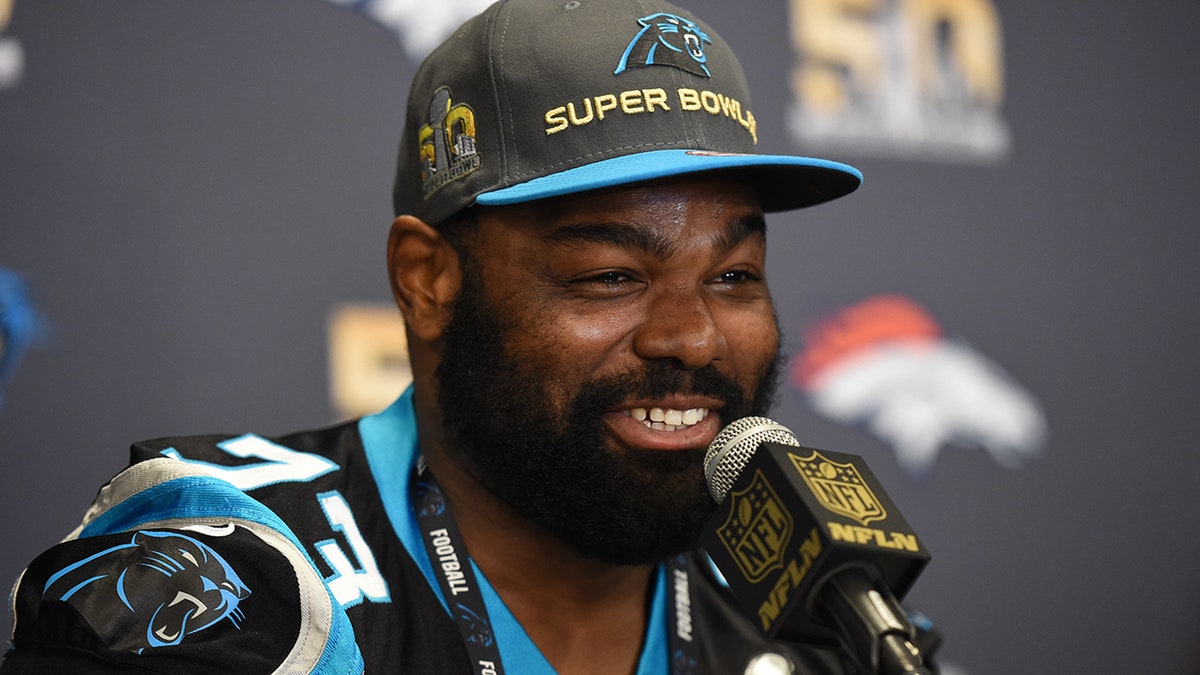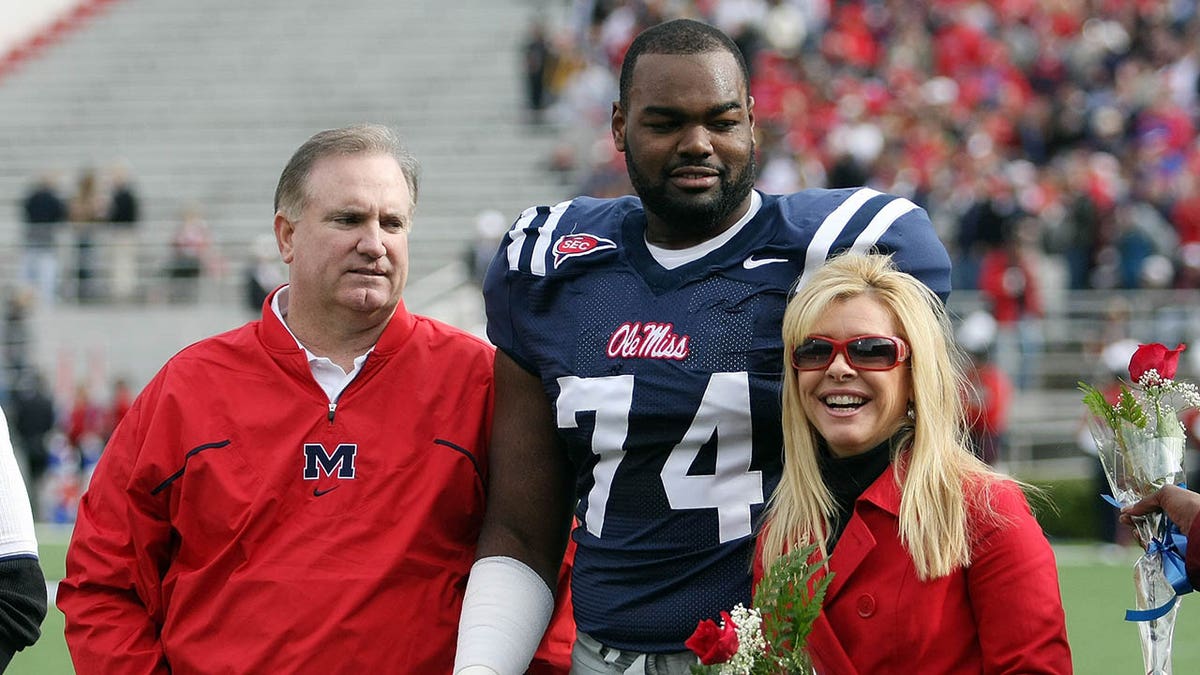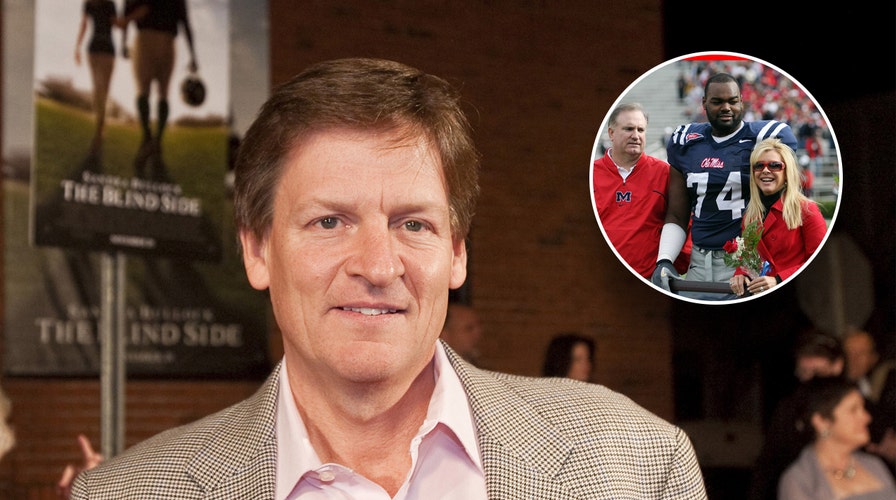Fox News Flash top sports headlines for August 16
Fox News Flash top sports headlines are here. Check out what's clicking on Foxnews.com.
"The Blind Side" author Michael Lewis, whose book based on the life of former NFL player Michael Oher was adapted for the film and was nominated for Best Picture at the Oscars, broke his silence on the drama between the subject and the Tuohy family.
Lewis told The Washington Post on Wednesday that no one who was involved in the book saw millions of dollars from the movie. The movie earned nearly $310 million from the box office. In the book, Lewis followed Oher from his upbringing in a poor community, his years at a private school in Tennessee to his alleged adoption by Sean and Leigh Anne Tuohy.
Oher filed a lawsuit Monday claiming the Tuohys never adopted him but created a conservatorship over him. Oher says he received nothing from the movie. Tuohy’s lawyer said Wednesday they estimated Oher and the family received $100,000 apiece, and the couple paid taxes on the player’s portion.
CLICK HERE FOR MORE SPORTS COVERAGE ON FOXNEWS.COM

Author of "The Blind Side: Evolution of a Game" Michael Lewis attends the "The Blind Side" benefit premiere at the Prytania Theatre on Nov. 19, 2009 in New Orleans. (Getty Images)
"Everybody should be mad at the Hollywood studio system," Lewis told The Washington Post. "Michael Oher should join the writers strike. It’s outrageous how Hollywood accounting works, but the money is not in the Tuohys’ pockets."
Lewis said the studio paid $250,000 for the option to make the book into a movie, and he said he split the money evenly with the Tuohy family. He said the Tuohy family said they split their share. While the movie was a box office smash, Lewis said he and the Tuohy family received around $350,000 each from the movie’s profits.
Lewis said the Tuohy family planned to share the money with Oher, but the NFL player declined his royalty checks. Lewis said he thought the Tuohy family had put the checks into a trust for Oher’s son.

Michael Oher, #73, during the Carolina Panthers press conference for Super Bowl 50 at the San Jose Convention Center in San Jose, California. (Chris Williams/Icon Sportswire/Corbis/Icon Sportswire via Getty Images)
"What I feel really sad about is I watched the whole thing up close," Lewis said. "They showered him with resources and love. That he’s suspicious of them is breathtaking. The state of mind one has to be in to do that — I feel sad for him."
One of the Tuohy lawyers, Randall Fishman, said Wednesday that the family is looking to end the conservatorship. He said the family intends to enter into a consent order to end the conservatorship and that Oher mentioned being conservators for him three times in his 2011 book, "I Beat The Odds: From Homeless, To The Blindside."
The family’s attorney also said the Tuohys and Oher had been estranged for about a decade. Steve Farese said Oher had become "more and more vocal and more and more threatening" over the past decade or so, and this is "devastating for the family."
Oher claimed the Tuohys falsely represented themselves as his adoptive parents and said he discovered this past February the conservatorship was not the arrangement he thought it was.
Michael Singer, another attorney who represents the Tuohys, said Tuesday that Oher threatened to "plant" a negative story in the press about the family unless they paid him $15 million. Singer denied the allegations leveled against the Tuohy family in Oher’s petition to end their conservatorship, calling them "hurtful and absurd."
Singer added that the family has been "upfront" about how and why the conservatorship was established and that they "will never oppose it in any way" if Oher chooses to terminate it.
The conservatorship paperwork was filed months after Oher turned 18 in May 2004. Oher accused the family of never taking legal action to assume custody of him from the Tennessee Department of Human Services before he turned 18. Though, he says he was forced to call Sean and Leigh Anne Tuohy "mom" and "dad."
Oher says he was "falsely advised" that it would be called a conservatorship because he was already 18, but that adoption was the intent.
Fishman said the couple did not adopt Oher because the conservatorship was the quickest way to satisfy the NCAA’s concerns the family was not just steering him to Ole Miss to play football. It is the Tuohys' alma mater. A belief Lewis also mentioned to The Washington Post.
As for the proceeds from the film, the couple said agents negotiated a small advance for them from the production company for the film. They said that included a "tiny percentage of net profits" divided equally among a group that included Oher. Attorneys said they estimated Oher and the family received $100,000 apiece, and the couple paid taxes on the player’s portion.

Michael Oher, #74 of the Ole Miss Rebels, stands with his family during senior ceremonies prior to a game against the Mississippi State Bulldogs at Vaught-Hemingway Stadium on Nov. 28, 2008 in Oxford, Mississippi. (Matthew Sharpe/Getty Images)
The Tuohys said the conservatorship was set up to help Oher with health insurance, get a driver’s license and be admitted to college. In Tennessee, a conservatorship removes power from a person to make decisions for himself. It is often used in the case of a medical condition or a disability.
Oher’s petition said the conservatorship was approved "despite the fact that he was over 18 years old and had no diagnosed physical or psychological disabilities."
CLICK HERE TO GET THE FOX NEWS APP
Oher was drafted by the Baltimore Ravens in the first round of the 2009 NFL Draft. He won a Super Bowl with the Ravens. He also played for the Carolina Panthers and Tennessee Titans.
Fox News’ Paulina Dedaj and The Associated Press contributed to this report.












































